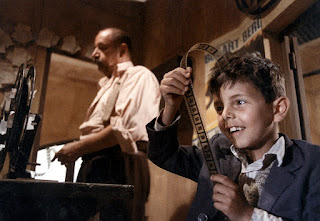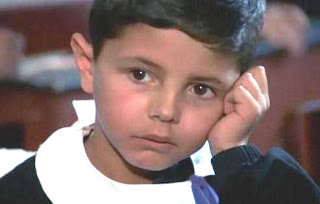NEW - Salvatore Cascio - actor
Child star of classic movie Cinema Paradiso
The actor Salvatore Cascio, who earned fame through his starring role in the Oscar-winning movie Cinema Paradiso, was born on this day in 1979 in Palazzo Adriano, a small town in a mountainous area of western Sicily. In Guiseppe Tornatore’s nostalgic 1988 drama, Cascio was the eight-year-old child chosen to play the part of the the film’s central character as a small boy in a Sicilian village who loves to watch films at his local cinema and develops a friendship with the cinema’s grumpy but good-hearted projectionist, Alfredo. His performance was so charming and captivating it won him the prize for best actor in a supporting role at the 1990 BAFTAs. He remains the only Italian to have won such an award. Roberto Benigni, star and director of the 1997 film Life is Beautiful, is the only Italian to have won a BAFTA as best actor. By coincidence, the lead character in Cinema Paradiso is also called Salvatore and, like Cascio, is known as a boy as Totò, the Sicilian diminutive of Salvatore. Landing the part was not down to just having the same name, however, although it helped when it came to filming. Read more…
_____________________________________
Sandro Mazzola - footballer
Tragedy instilled determination to succeed
The footballer Sandro Mazzola, widely regarded as one of Italy’s greatest players after a glittering career with Internazionale of Milan and the Italian national team, was born on this day in 1942 in Turin. A forward or attacking midfield player with all the attributes of the world’s best players, Mazzola won four Serie A titles and two European Cups for Inter-Milan, largely under the coaching of Helenio Herrero. His goals tally in Serie A games alone was 116 in 417 appearances. He was capped 70 times by the national team, part of the side that won the 1968 European championships and reached the World Cup final in 1970. Mazzola always saw his success as a tribute to his father, Valentino, a brilliant player who was captain of the Torino team that was almost entirely wiped out in the Superga air disaster of 1949, when a plane carrying the team back from a friendly in Portugal crashed in thick fog into the rear wall of the Basilica of Superga, which overlooks the city of Turin. His parents had divorced in 1946 but Valentino won custody of his son and instilled in him a love of football, as well as teaching him the basic skills. Read more…
______________________________________
Virna Lisi - actress
Screen siren turned back on glamour roles to prove talent
The actress Virna Lisi, born on this day in 1936, might have become the new Marilyn Monroe if she had allowed Hollywood to shape her career in the way the movie moguls had planned. She was certainly blessed with all the physical attributes to fulfil their commercial ambitions - no less a screen goddess than Brigitte Bardot called her 'the most beautiful woman in the world' - but decided she was too good an actress to be typecast as mere window dressing or eye candy and ultimately rejected their advances. In time she proved to herself that she made the right decision when her portrayal of the manipulative Catherine de' Medici, the Italian who was Queen of France between 1547 and 1559, in Patrice Chéreau’s 1994 film La Reine Margot won her three awards - Best Actress at the Cannes Film Festival, a César (the French equivalent of an Oscar) and the Italian film critics' award, the Nastro d'Argento (Silver Ribbon). Born Virna Pieralisi in the town of Jesi, in the province of Ancona in Marche, where her father had a marble importing business, she moved with her family to Rome in the early 1950s. Read more…
______________________________________
Francesco Molinari – golfer
Second win in Italian Open gave him unique status
Francesco Molinari, one of two golfing brothers who have advanced the cause of the sport in Italy more than anyone in the modern era, was born on this day in 1982 in Turin. He and Edoardo, who is 21 months’ his senior, won the Mission Hills World Cup in China in 2009, the first time Italy had won the two-player team event. And when he sank a 5ft (1.5m) putt to beat the Masters champion Danny Willett to win the Italian Open in Monza in September 2016, Francesco became the first Italian to win his country’s open championship twice since it became part of the European tour in 1972. He had won it for the first time in 2006 at the Castello di Tolcinasco course just outside Milan, which gave him his first European tour victory at the age of 23 and made him the first Italian to win the tournament since Massimo Mannelli in 1980. The success made such an impact in Italy, and in Turin in particular, that Francesco was asked to be one of the official torch carriers on behalf of the host nation at the 2006 Winter Olympics, which were staged in Turin. Francesco had yet to win a major at the time this was originally posted but went close in the 2017 PGA Championship at the Quail Hollow Club in Charlotte, North Carolina, before winning the Open Championship at Carnoustie in Scotland in 2018. Read more…
_____________________________________
Francis I of the Two Sicilies
Death of the king who failed to impress Lady Blessington
Francis I died in Naples on this day in 1830 after having been King of the Two Sicilies for five years. The Two Sicilies was the largest of all the Italian states before unification, originally formed as a union between the Kingdom of Sicily and the Kingdom of Naples. It lasted until 1860 when it was annexed by the Kingdom of Sardinia, which became Italy in 1861. The Two Sicilies originated when the Kingdom of Sicily was divided in 1283. The King at the time lost the island of Sicily but kept control of his part of southern Italy, which was also referred to as Sicily. The Two Sicilies had capitals in Palermo and Naples. After Francis succeeded his father Ferdinand I in 1825 he took little part in government and lived with his mistresses in constant fear of assassination. He is remembered for getting the Austrian occupation force removed from Naples, where it had been billeted at the expense of the treasury, and for founding the Royal Order of Francis I to reward civil merit. We are fortunate to have been left with an impression of him by Lady Blessington, an English aristocrat, who lived in Naples between 1823 and 1826 and kept a fascinating diary of her time there. In July 1823 she encountered Francis while he was still Prince of Salerno and heir presumptive to the throne. Read more…
_______________________________________
Paolo Taviani - film director
Half of a successful partnership with brother Vittorio
The film director Paolo Taviani, the younger of the two Taviani brothers, whose work together won great acclaim and brought them considerable success in the 1970s and 80s in particular, was born on this day in 1931 in San Miniato, Tuscany. With his brother Vittorio, who was two years his senior and died in April of this year, he wrote and directed more than 20 films. Among their triumphs were Padre Padrone (1977), which won the Palme d’Or and the International Federation of Film Critics (FIPRESCI) prize at the Cannes Film Festival, La notte di San Lorenzo (The Night of the Shooting Stars) 1982, which won the Grand Prix du Jury at Cannes, and Caesar Must Die (2012), which won the Golden Bear at the Berlin International Film Festival. The brothers famously would work in partnership, directing alternate scenes, one seldom criticising the other, if ever. The actor Marcello Mastroianni, who starred in their 1974 drama Allonsanfàn, is said to have addressed the brothers as “Paolovittorio.” They were both born and raised in San Miniato by liberal, anti-Fascist parents who introduced them to art and culture. Read more…
Booking.com.jpg)



.jpg)



.jpeg)

.jpg)

.jpg)


.jpg)


